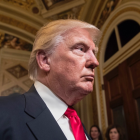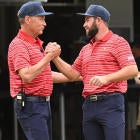Update: Bernard Langer released a statement Thursday that basically said he never spoke with Donald Trump about voter fraud but that he did tell a friend's story to another person, who related it to someone involved with Trump or the White House third-hand.
"Unfortunately, the report in the New York Times and other news outlets was a mischaracterization by the media. The voting situation reported was not conveyed from me to President Trump, but rather was told to me by a friend. I then relayed the story in conversation with another friend, who shared it with a person with ties to the White House. From there, it was misconstrued.
"I am not a citizen of the United States and cannot vote. It's a privilege to live in the United States, and I am blessed to call America my home. I will have no further comment at this time."
While Langer says that the story was a "mischaracterization by the media," the Times did indeed note that it might very well have been a second- or third-hand story told to Trump in the original version of its article (as referenced below).
Original story
This is not a golf story I expected to come to light during the Donald Trump presidency. Then again, do we really know what to expect anymore?
Over the past two days, Trump has ratcheted up claims of voter fraud unsupported by evidence to the tune of three million to five million votes in an effort to prove that he would have won the popular vote -- which he lost to Hillary Clinton by 2.8 million votes -- if not for a variety of unproven illegal and fraudulent votes in multiple states. These claims have been roundly debunked by experts, who say there is no evidence whatsoever that illegal or fraudulent voting has occurred in the United States in any substantial number.
On Wednesday, the New York Times unearthed a strange nugget that might explain why Trump believes voter fraud exists. It involves two-time Masters winner Bernhard Langer, "the very famous golfer." Trump, according to the Times, has used this story to prop up his decision to pursue action in his claim of voter fraud.
Trump spoke at a meeting with leaders from the Senate and House of Representatives on Monday and told a story that was relayed to the paper.
The witnesses described the story this way: Mr. Langer, a 59-year-old native of Bavaria, Germany -- a winner of the Masters twice and of more than 100 events on major professional golf tours around the world -- was standing in line at a polling place near his home in Florida on Election Day, the president explained, when an official informed Mr. Langer he would not be able to vote.
Ahead of and behind Mr. Langer were voters who did not look as if they should be allowed to vote, Mr. Trump said, according to the staff members -- but they were nonetheless permitted to cast provisional ballots. The president threw out the names of Latin American countries that the voters might have come from.
Mr. Langer, whom he described as a supporter, left feeling frustrated, according to a version of events later contradicted by a White House official. Just one problem: Mr. Langer, who lives in Boca Raton, Fla., is a German citizen with permanent residence status in the United States who is, by law, barred from voting, according to Mr. Langer's daughter Christina.
Others familiar with the situation noted that the story was not necessarily about Langer but told to Trump by Langer about one of the golfer's friends. Either way, it obviously rang true with Trump.
Langer's daughter told the Times that her father is not Trump's friend and does not know why his name was mentioned in this instance.
















